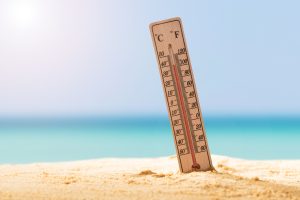 A new nationwide study has found that hospitals report more patients needing mental health services during periods of extreme heat during emergency department visits. During summer days with higher-than-normal temperatures, visits for mental health-related conditions rise, including anxiety and stress disorders, substance use, and mood disorders.
A new nationwide study has found that hospitals report more patients needing mental health services during periods of extreme heat during emergency department visits. During summer days with higher-than-normal temperatures, visits for mental health-related conditions rise, including anxiety and stress disorders, substance use, and mood disorders.
The Boston University School of Public Health study obtained medical claims data on mental health-related emergency room visits of more than 200 million Medicare Advantage enrollees throughout the US. Researchers analyzed approximately 3.5 million of these visits from adults aged 18 or older from 2010 to 2019.
Advertisement
Days with a record of extreme heat, defined as temperatures above the 95th percentile of temperature distributions, were most linked with emergency room visits for childhood-onset behavioral disorders and substance use disorders, followed by stress and anxiety and mood disorders. Extreme heat was also associated with emergency room visits for schizophrenia.
It was found that the impact of heat on mental health was similar across age groups and equally evident in both men and women in every region of the country. These results were able to show that heat can profoundly impact the mental health of people regardless of sex, age, or where they live.
Researchers want to identify public health strategies that can help alert people to the risks posed by extreme heat for future studies. Research we will also explore the impact of elevated temperatures on mental health during more extended periods.
The lingering effects of COVID-19 on mental health will also help to shape this work. Social isolation, lockdowns, and general uncertainty during the pandemic have increased the need for mental health services. As the upcoming summer season approaches, it is essential to keep in mind the combination of the pandemic and climate as stressors that may exacerbate existing mental health conditions.
Taking Care of Mental Health
Advertisement
Most people do not know the relationship between extreme heat in the summer months and mental health. But for those with pre-existing mental health conditions, it is essential to understand brain functions and how to reduce the risks posed by summer weather.
The Smart Pill contains a doctor-formulated variety of ingredients that can help reduce the factors that can take a toll on the ability of the brain to function at peak potential. In addition to the effects of normal aging, the brain is under constant attack from stress and environmental factors, affecting concentration, memory, and overall cognitive function.
The Smart Pill can help support and maintain healthy cognitive function by helping to boost circulation, fight free radicals, and provide nutritional support to assist in overall brain health.
